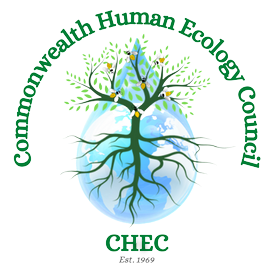An interview with Eva Ekehorn, Trustee and Hon. Secretary at CHEC
Eva and Helen Clark, former prime minister of New Zealand, at an event earlier this year.
Eva Ekehorn grew up in Sweden wanting to one day become a professional pianist. When realising her dream wouldn’t work out, she got herself a profession in mathematics and later changed her career course towards human ecology. “I returned to university and found human ecology, where I still feel very much at home. I joined the then very new doctoral programme in Gothenburg – actually so new that the students had to help with forming the course work!”
In 1987, Eva moved to London and joined CHEC’s Board. During the years at CHEC, she has served various roles, such as Hon. Treasurer and Trustee. Eva is currently CHEC’s Hon. Secretary.
Could you please tellus when you first became involved with CHEC and what attracted you to theorganisation?
While in Gothenburg, I got involved in the fairly new Society for Human Ecology, a US based organisation,and joined the Board as their International President. At the organisation’s second conference, Zena Daysh - the founder of CHEC - was a key note speaker, and as we were just about to move to London, she invited me to visit CHEC. Not only that but I was quickly elected to the Governing Board and have been there ever since. I have volunteered in the office and it has been fascinating to follow the work by CHEC through conferences, Commonwealth Heads of Government Meetings (CHOGM), Journals and projects. Zena was a star in the organisation and you could learn very much from her as well as from the very knowledgeable people on the Board and among thestaff. I have learnt a lot about the Commonwealth too, which is highly valuable.
What field within human ecology are you particularly interested in?
What is interesting with human ecology is the way you learn how to think. It is not just that we need to do something, it is also about asking the question of ‘what then’? What are the consequences of our actions, notonly on the environment but also on other human beings? Climate change and the consequences of the food we eat, the way we travel and live are all questions where you can ask yourself about the consequences of your actions. Since human ecology covers everything, you sometimes must slice the cake and focus on one issue, but you should always keep an open mind and try to understand how it is all connected.
What do you believe is CHEC’s biggest achievement?
Zena was one of the pioneers who got Commonwealth organisations involved in CHOGM and listened too. She got the politicians to listen – one of her legacies is the Indira Gandhi Centre in Jaipur. Several of our projects have been verygood, e.g. the Gender mainstreaming workshops in Uganda where people started to talk to each other and beginning tounderstand the other side’s problems. I am also proud of the project in India where we developed ways in which waste materials could be recycled for use in building and construction. I do think our information through our Journals, website and social media channels are a good way to spread our message of how people and the environment can live in harmony. I am especially proud of our Journal about Waste that has been spread world-wide.
This year, CHEC’s upcoming journal will be focusing on education as a tool towards sustainability. Why do you believe education could be a key towards a sustainable future?
I think it is quite clear that a good education, especially in human ecology, is a way to make people act more responsible. You must have an understanding of the way the world operates, what the ecosystems are, and what culture and social structures mean for the health of people. We need to interact more. Curiosity is a critical side of humanity, and education canstimulate that feature. It is not only children who need this education – many grownups too!
In your opinion, what environmental issues should CHEC continue to raise awareness of?
As you can see on the news all over the world, there are many issues connected to climate change: water and food security, health, waste and flooding. Well, you can find unlimited questions to discuss and inform about. One of our urgent tasks is to get people to understand climate change and act accordingly to stop the world from going under.
Looking at human ecology is such a good way to find outabout things. It also helps us to take more responsibility for our actions, which I believe is one of the things sustainability is about. When it comes to issues within human ecology, there are always explanations to why they occur. But to be successful in informing others, you must be able to do it in a way that people will understand. In my opinion, this is one of CHEC’s strengths.

